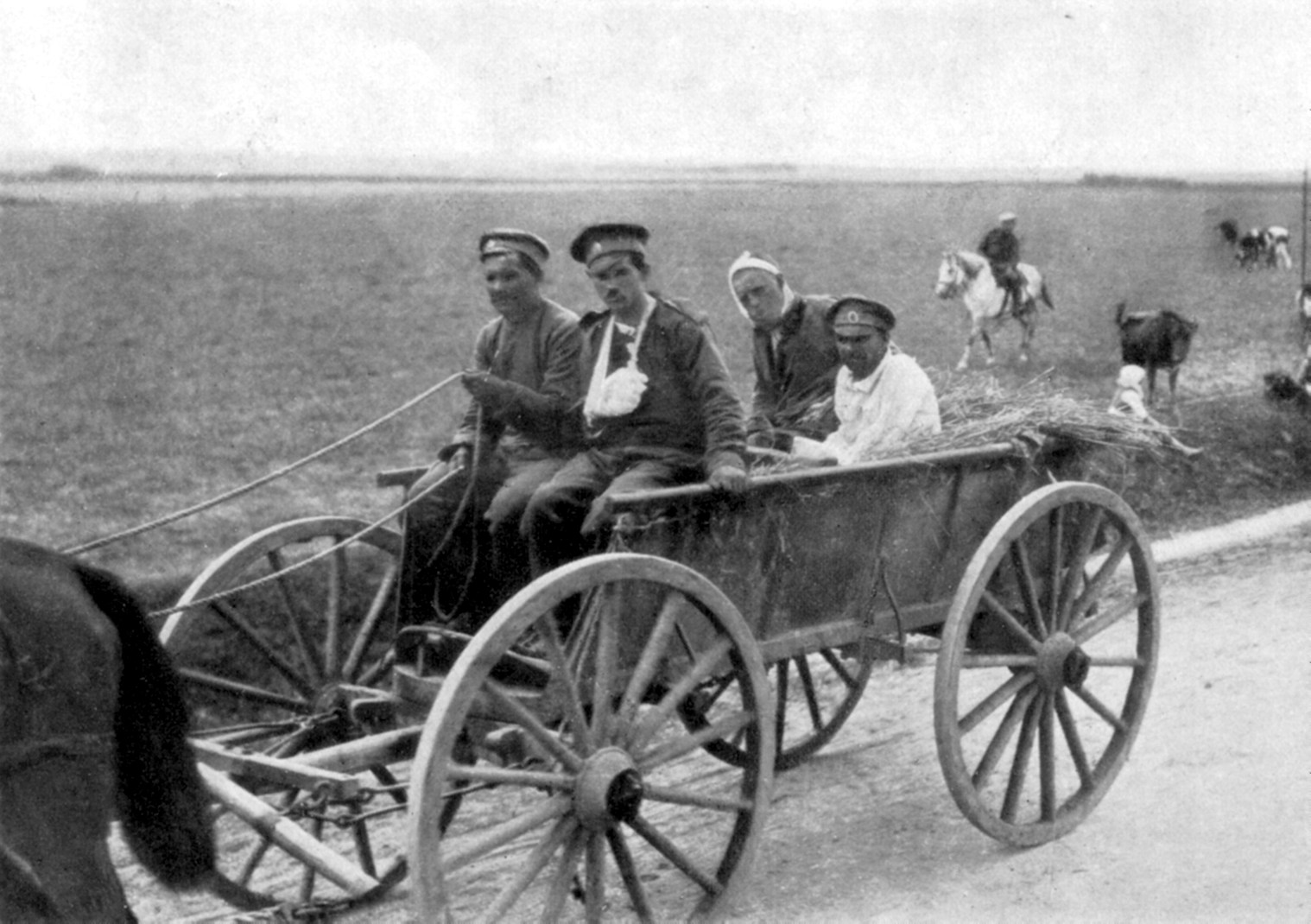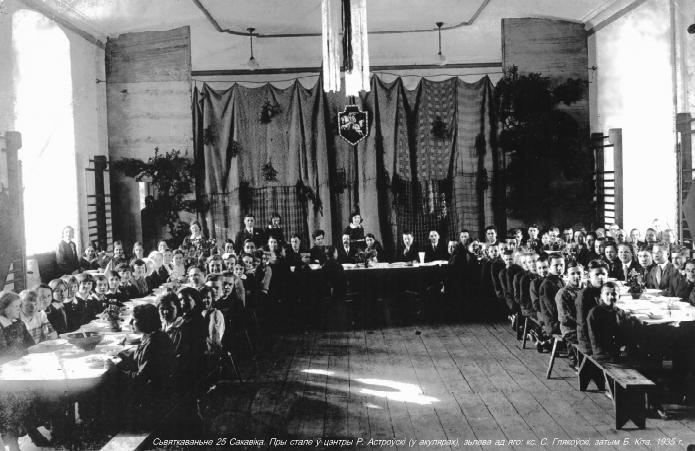|
Tamaš Hryb
Tamaš Hryb (, Tamash Hryb, 7 March 1895 — 21 January 1938) was a Belarusian politician, journalist and writer. Early life Tamaš Hryb was born into a peasant family in the village of Paliany in what is now the border region of Belarus and the Republic of Lithuania. After completing elementary education in local schools, he studied in St. Petersburg. He served in the Russian Navy, then went to study at the St. Petersburg Psychoneurological Research Institute. As a student, he became an active member of Belarusian political groups in St. Petersburg.Hryb Tamaš - slounik.org After the , he became a full-time politician organising Belarusian soldiers and workers in the western part of the [...More Info...] [...Related Items...] OR: [Wikipedia] [Google] [Baidu] |
February Revolution
The February Revolution (), known in Soviet historiography as the February Bourgeois Democratic Revolution and sometimes as the March Revolution or February Coup was the first of Russian Revolution, two revolutions which took place in Russia in 1917. The main events of the revolution took place in and near Petrograd (now Saint Petersburg), the then-capital of Russia, where long-standing discontent with the monarchy erupted into mass protests against food rationing on 23 February Old Style and New Style dates, Old Style (8 March Old Style and New Style dates, New Style). Revolutionary activity lasted about eight days, involving mass demonstrations and violent armed clashes with police and Special Corps of Gendarmes, gendarmes, the last loyal forces of the Russian monarchy. On 27 February O.S. (12 March N.S.), most of the forces of the capital's garrison sided with the revolutionaries. In the same day, the Russian Provisional Government, made up by left-leaning State Duma (Russ ... [...More Info...] [...Related Items...] OR: [Wikipedia] [Google] [Baidu] |
Wilno
Vilnius ( , ) is the capital of and List of cities in Lithuania#Cities, largest city in Lithuania and the List of cities in the Baltic states by population, most-populous city in the Baltic states. The city's estimated January 2025 population was 607,667, and the Vilnius urban area (which extends beyond the city limits) has an estimated population of 747,864. Vilnius is notable for the architecture of its Vilnius Old Town, Old Town, considered one of Europe's largest and best-preserved old towns. The city was declared a World Heritage Site, UNESCO World Heritage Site in 1994. The architectural style known as Vilnian Baroque is named after the city, which is farthest to the east among Baroque architecture, Baroque cities and the largest such city north of the Alps. The city was noted for its #Demographics, multicultural population during the Polish–Lithuanian Commonwealth, with contemporary sources comparing it to Babylon. Before World War II and The Holocaust in Lithuania, th ... [...More Info...] [...Related Items...] OR: [Wikipedia] [Google] [Baidu] |
Polish Academy Of Sciences
The Polish Academy of Sciences (, PAN) is a Polish state-sponsored institution of higher learning. Headquartered in Warsaw, it is responsible for spearheading the development of science across the country by a society of distinguished scholars and a network of research institutes. It was established in 1951, during the early period of the Polish People's Republic following World War II. History The Polish Academy of Sciences is a Polish state-sponsored institution of higher learning, headquartered in Warsaw, that was established by the merger of earlier science societies, including the Polish Academy of Learning (''Polska Akademia Umiejętności'', abbreviated ''PAU''), with its seat in Kraków, and the Warsaw Society of Friends of Learning (Science), which had been founded in the late 18th century. The Polish Academy of Sciences functions as a learned society acting through an elected assembly of leading scholars and research institutions. The Academy has also, operating throug ... [...More Info...] [...Related Items...] OR: [Wikipedia] [Google] [Baidu] |
Joanna Gierowska-Kałłaur
Joanna is a feminine given name deriving from from . Variants in English include Joan, Joann, Joanne, and Johanna. Other forms of the name in English are Jan, Jane, Janet, Janice, Jean, and Jeanne. The earliest recorded occurrence of the name Joanna, in Luke 8:3, refers to the disciple "Joanna the wife of Chuza," who was an associate of Mary Magdalene. Her name as given is Greek in form, although it ultimately originated from the Hebrew masculine name יְהוֹחָנָן ''Yəhôḥānān'' or יוֹחָנָן ''Yôḥānān'' meaning 'God is gracious'. In Greek this name became Ιωαννης ''Iōannēs'', from which ''Iōanna'' was derived by giving it a feminine ending. The name Joanna, like Yehohanan, was associated with Hasmonean families. Saint Joanna was culturally Hellenized, thus bearing the Grecian adaptation of a Jewish name, as was commonly done in her milieu. At the beginning of the Christian era, the names Iōanna and Iōannēs were already common in Judea. ... [...More Info...] [...Related Items...] OR: [Wikipedia] [Google] [Baidu] |
Jazep Mamońka
Jazep Mamońka (; 28 January 1889 – 10 September 1937) was а Belarusian politician and victim of Stalin’s purges. Early years Mamońka was born in the village of Zaliessie in Minsk governorate of the Russian Empire (now Slucak district of Minsk region in Belarus).Арлоў, Уладзімер (2020). ІМЁНЫ СВАБОДЫ (Бібліятэка Свабоды. ХХІ стагодзьдзе)'' Uładzimir_Arłou.html" ;"title="'Uładzimir Arłou">'Uładzimir Arłou. The Names of Freedom (The Library of Freedom. ХХІ century.)''(PDF) (in Belarusian) (4-е выд., дап. ed.). Радыё Свабодная Эўропа / Радыё Свабода - Radio Free Europe/Radio Liberty. pp. 152–153.Маракоў, Леанід.Рэпрэсаваныя літаратары, навукоўцы, работнікі асветы, грамадскія і культурныя дзеячы Беларусі. 1794-1991: Мамонька Язэп Аляксеевіч epressed writ ... [...More Info...] [...Related Items...] OR: [Wikipedia] [Google] [Baidu] |
Paluta Badunova
Paluta Aliaksandraŭna Badunova (, ; 7 September 1885 – 29 November 1938) was a key female political figure in the Belarusian independence movement of the early 20th century. She was the only woman at the Rada of the Belarusian Democratic Republic, and later became a victim of Soviet repressions in Belarus. Early years Badunova was born in the town of Navabelitsa (now one of the districts of Gomel). Her father, Alexander Vosipavich, rented a small estate, which was the main income of the family, and raised seven children - two sons and five daughters. She graduated from a two-grade school in Buynichy, near Mogilev, after which she passed the exams for the title of home teacher of Russian language and geography. In 1905, she started working in the schools of the Gomel district. In 1914-1917, she studied at higher historical and literary courses in Petrograd, studying literature, history and geography. Revolutionary and nationalist activities She was elected to the Pe ... [...More Info...] [...Related Items...] OR: [Wikipedia] [Google] [Baidu] |
Freedom Day (Belarus)
Freedom Day (; ) is an unofficial holiday in Belarus celebrated on 25 March to commemorate the declaration of independence by the Belarusian Democratic Republic by the Third Constituent Charter on that date in 1918. It is also known as the 25-aha sakavika (, March 25) day. Freedom Day has been celebrated as the Independence Day of Belarus by the Belarusian independence movement since the early 1920s. It is widely celebrated by the Belarusian diaspora. In the United States, governors and US presidents, including Dwight Eisenhower, Ronald Reagan, George H. W. Bush and Bill Clinton, have traditionally issued official greetings to the Belarusian American community on 25 March. The Belarusian opposition to the dictatorial regime of Alexander Lukashenko celebrates Freedom Day annually. The protests in Belarus are regularly accompanied by mass detention and torture of the protesters. The government does not recognize Freedom Day claiming that the Belarusian Democratic Republic was ... [...More Info...] [...Related Items...] OR: [Wikipedia] [Google] [Baidu] |
Belarusian Democratic Republic
The Belarusian People's Republic (BNR; , ), also known as the Belarusian Democratic Republic, was a state proclaimed by the Council of the Belarusian Democratic Republic in its Second Constituent Charter on 9 March 1918 during World War I. The Council proclaimed the Belarusian Democratic Republic independent in its Third Constituent Charter on 25 March 1918 during the occupation of contemporary Belarus by the Imperial German Army. The government of the Belarusian Democratic Republic never had power over the whole territory of Belarus. In 1919, it co-existed with an alternative Russian Soviet Federative Socialist Republic, Soviet Russia-controlled Socialist Soviet Republic of Byelorussia (which later became part of the Socialist Soviet Republic of Lithuania and Belorussia, Lithuanian–Byelorussian Soviet Socialist Republic), moving its seat of government to Vilnius and Hrodna, but ceased to exist due to the partition of the whole Belarusian territory between the Bolshevik Red Ar ... [...More Info...] [...Related Items...] OR: [Wikipedia] [Google] [Baidu] |
Constituent Charters Of Belarus
{{Disambiguation ...
Constituent or constituency may refer to: Politics * An electoral district or constituency * Constituent, an individual citizen or voter represented by a politician within an electoral district, state, community, or organization * Advocacy group or constituency * Constituent assembly * Constituent state (territory, country, etc.): an administrative division of a larger state Other meanings * Constituent (linguistics), a word or a group of words that function as a single unit within a hierarchical structure * Constituent quark, a current quark with a notional "covering" See also * Ingredient * Part (other) Part, parts or PART may refer to: People *Part (surname) * Parts (surname) Arts, entertainment, and media * Part (music), a single strand or melody or harmony of music within a larger ensemble or a polyphonic musical composition * Part (bibliogr ... [...More Info...] [...Related Items...] OR: [Wikipedia] [Google] [Baidu] |
Rada Of The Belarusian Democratic Republic
The Rada of the Belarusian People's Republic (, ) was the governing body of the Belarusian Democratic Republic. Since 1919, the Rada BNR has been in exile where it has preserved its existence among the Belarusian diaspora as an advocacy group promoting support to Belarusian independence and democracy in Belarus among Western policymakers. , the Rada BNR is the oldest existing government in exile. Formation The Rada BNR was founded as the executive body of the First All-Belarusian Congress, held in Minsk in December 1917 with over 1800 participants from different regions of Belarus including representatives of Belarusian national organisations, regional zemstva, main Christian denominations and Belarusian Jewish political parties. The work of the Congress was violently interrupted by the Bolsheviks. After retreat of the Bolsheviks from Minsk, the Rada (council) declared itself supreme power in Belarus. After the Bolsheviks and the Germans had signed the Treaty of Brest-L ... [...More Info...] [...Related Items...] OR: [Wikipedia] [Google] [Baidu] |
Minsk
Minsk (, ; , ) is the capital and largest city of Belarus, located on the Svislach (Berezina), Svislach and the now subterranean Nyamiha, Niamiha rivers. As the capital, Minsk has a special administrative status in Belarus and is the administrative centre of Minsk region and Minsk district. it has a population of about two million, making Minsk the Largest cities in Europe, 11th-most populous city in Europe. Minsk is one of the administrative capitals of the Commonwealth of Independent States (CIS) and the Eurasian Economic Union (EAEU). First mentioned in 1067, Minsk became the capital of the Principality of Minsk, an appanage of the Principality of Polotsk, before being annexed by the Grand Duchy of Lithuania in 1242. It received town privileges in 1499. From 1569, it was the capital of Minsk Voivodeship, an administrative division of the Polish–Lithuanian Commonwealth. It was part of the territories annexed by the Russian Empire in 1793, as a consequence of the Second Part ... [...More Info...] [...Related Items...] OR: [Wikipedia] [Google] [Baidu] |





